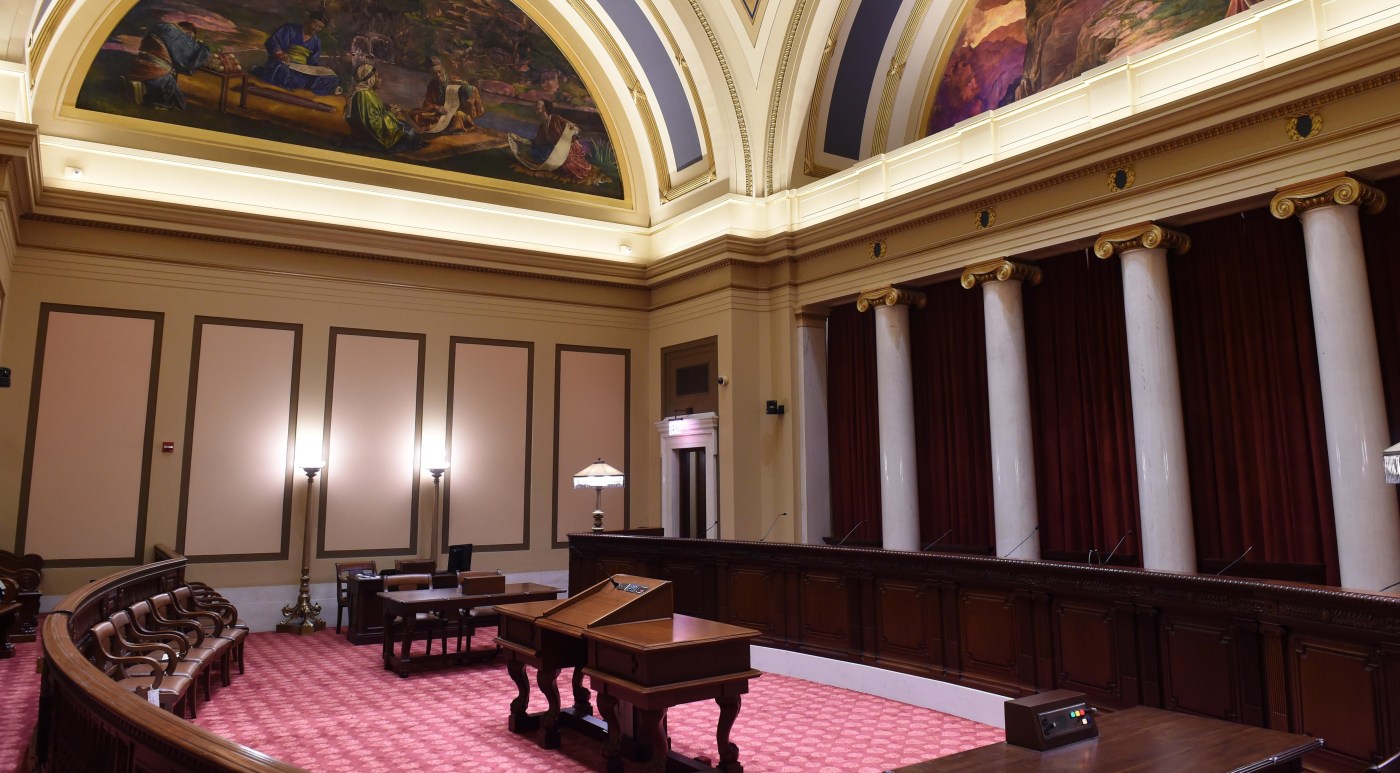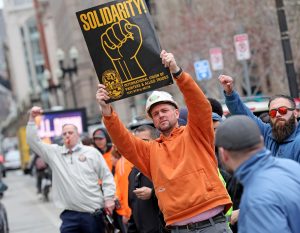
MN justices hear arguments in felon voting rights case
Whether felons on supervised release can continue to vote is now in the hands of the Minnesota Supreme Court.
The court’s seven justices on Monday heard arguments in a challenge to a new state law that restored the vote to more than 55,000 felons on probation, parole and supervised release last year.
The change came after decades of advocacy at the Capitol and an unsuccessful lawsuit from the American Civil Liberties Union of Minnesota. It continues to face challenges nearly a year after it became law.
Lawmakers moved quickly last spring to restore voting rights after the Supreme Court ruled against the ACLU challenge and said the issue was up to the state Legislature. By June, people with felonies on supervised release were registering to vote.
Anoka County lawsuit
Then a conservative-aligned group called the Minnesota Voters Alliance filed a lawsuit in Anoka County to challenge the new law on constitutional grounds. A judge there dismissed their case in December, prompting the appeal to the state’s highest court.
Monday’s hearing centered around two main questions: the constitutionality of the law, and whether the Minnesota Voters Alliance had standing to intervene in the case.
James Dickey, an attorney with the Upper Midwest Legal Center, a conservative law firm representing the voters group in the case, argued the new law violated the state Constitution — which bars felons from voting until “restored to civil rights.”
Gaining the right to vote in itself is not a restoration of civil rights, Dickey argued, as the bill enacted last year does not explicitly mention other rights, such as running for office and serving on a jury.
Since the state’s Constitution says a person convicted of a felony or treasonous act can vote once their civil rights are restored, the Legislature merely restoring the right to vote through a law is not sufficient, since it is not rights in the plural, Dickey told the justices.
Questions from justices
Associate Justice Margaret H. Chutich pried at Dickey’s argument about rights in the plural, noting felons already have many rights restored upon release, and that there’s no constitutional restriction on felons from serving on juries — despite courts not allowing them to do so. She also noted probation itself was not around when Minnesota framed its Constitution in the 1800s.
The voters group also claimed it had standing to intervene because the Legislature appropriated money in the felon voting rights bill — an argument that failed to persuade an Anoka County judge in December.
Justices, including Chief Justice Natalie Hudson, also appeared skeptical of that taxpayer standing argument, saying the money is tangentially related to the felon voting rights law as it is there to help the Secretary of State educate the public on new voting rights and is not core to the bill.
State asks for ruling by June 28
In defending the felon voting law from the Minnesota Voters Alliance challenge, Minnesota Assistant Attorney General Nathan Hartshorn argued the Minnesota Voters Alliance hadn’t “even attempted” to allege they’d suffered “due to thousands of their neighbors being re-enfranchised.” He criticized the constitutional challenge as coming down to hinging on a single letter, “s”, distinguishing civil rights in the plural from the singular “civil right.”
He also said the lawsuit ultimately spreads “fear and uncertainty” about voting rights in newly enfranchised communities.
Hartshorn asked the Supreme Court to make a ruling in the case no later than June 28 as early voting begins the day after.
At a news conference following the hearing, ACLU and voting advocates echoed Hartshorn’s argument that the lawsuit is spreading confusion about voting rights.
Craig Coleman, an attorney who does pro bono work for the ACLU and represented clients in the group’s original challenge to the state’s felon voting rights ban, said he thinks the new law will remain in place.
“It’s just inconceivable that the same court is going to now … play a game of gotcha and tell the Legislature: ‘Oh, you didn’t do it quite right way,’ ” he said “We just see no chance of that. So we’re looking forward to a quick decision.”
Constitutional amendment
In an emailed statement, Minnesota Voters Alliance Executive Director Andy Cilek denied his group is attempting to generate confusion surrounding the law, and said they remain hopeful the court will strike down the law as unconstitutional.
“Then proponents can put a constitutional amendment on the ballot for the voters to decide,” he said. “Which is what they should have done in the beginning.”
Twenty-three states restore voting rights upon release from incarceration, according to the National Conference of State Legislatures. Maine, Vermont and Washington, D.C. allow incarcerated people to vote.
Related Articles
Minnesota Supreme Court to hear felon voting rights case
St. Paul attorney barred from practicing law after accusations of pocketing settlement money from Hmong clients
Minnesota Chief Justice Natalie Hudson: On the importance of a fair and independent judiciary
Harry Niska: To protect democracy? People and their representatives, not judges, should make political choices
Letters: What will our new Professional Women’s Hockey League team be called?


